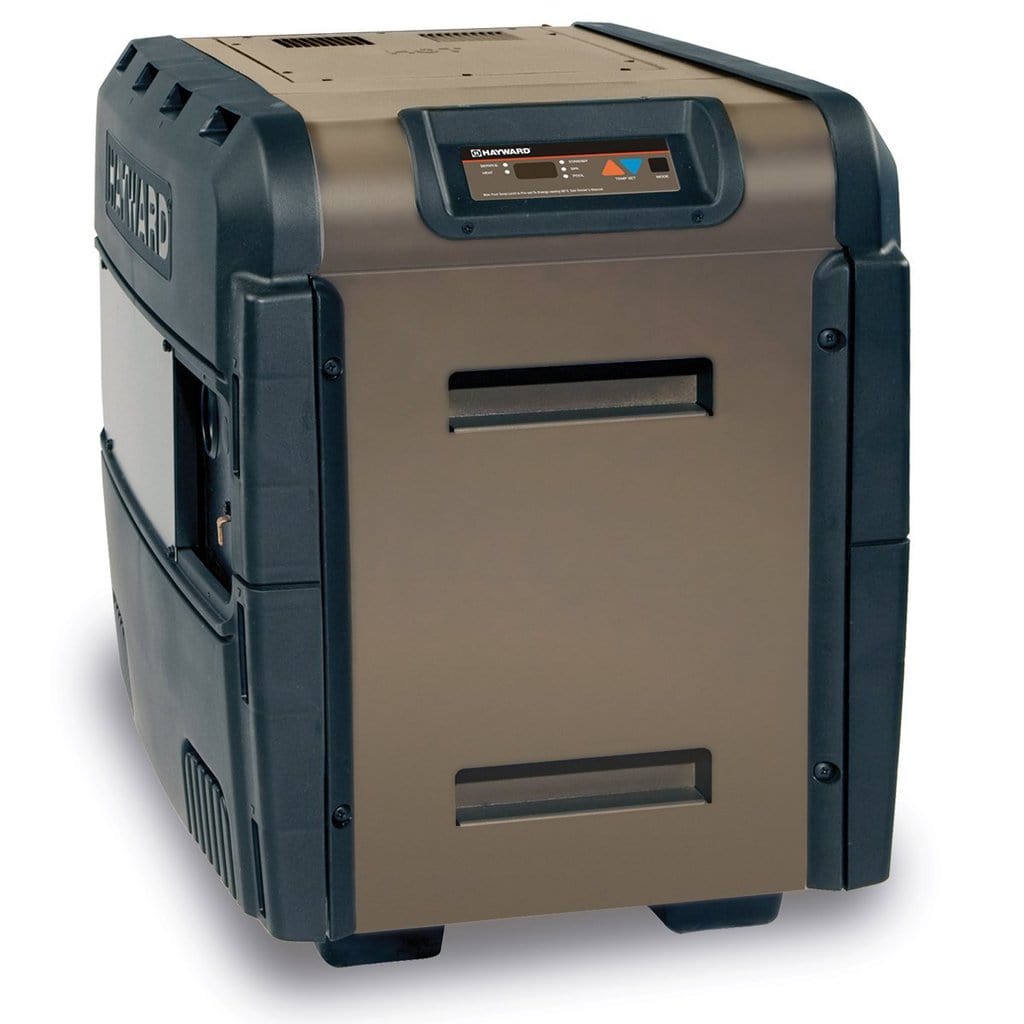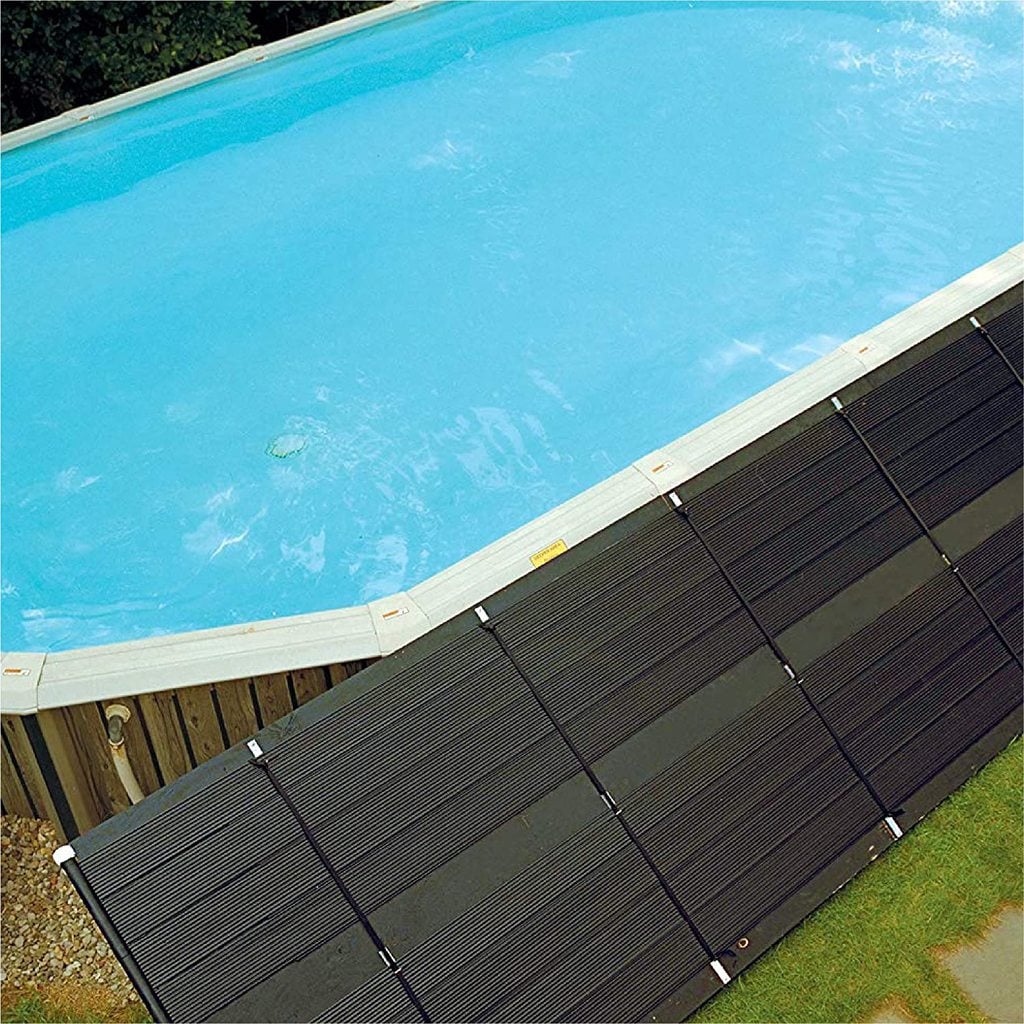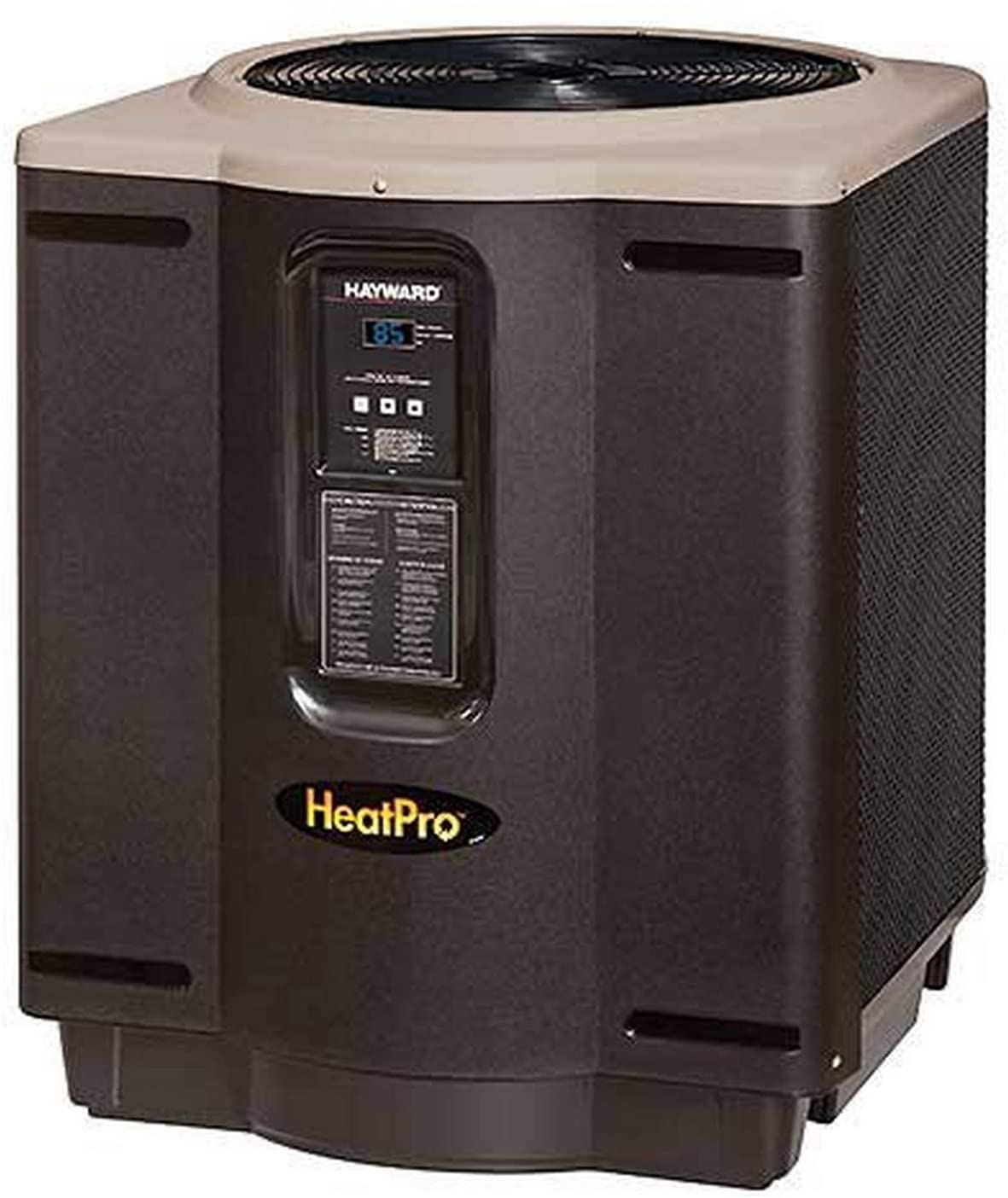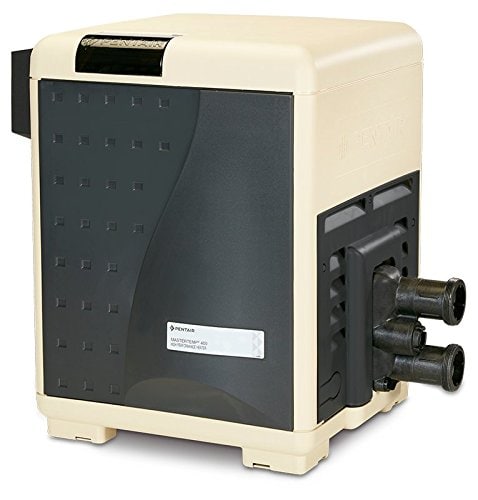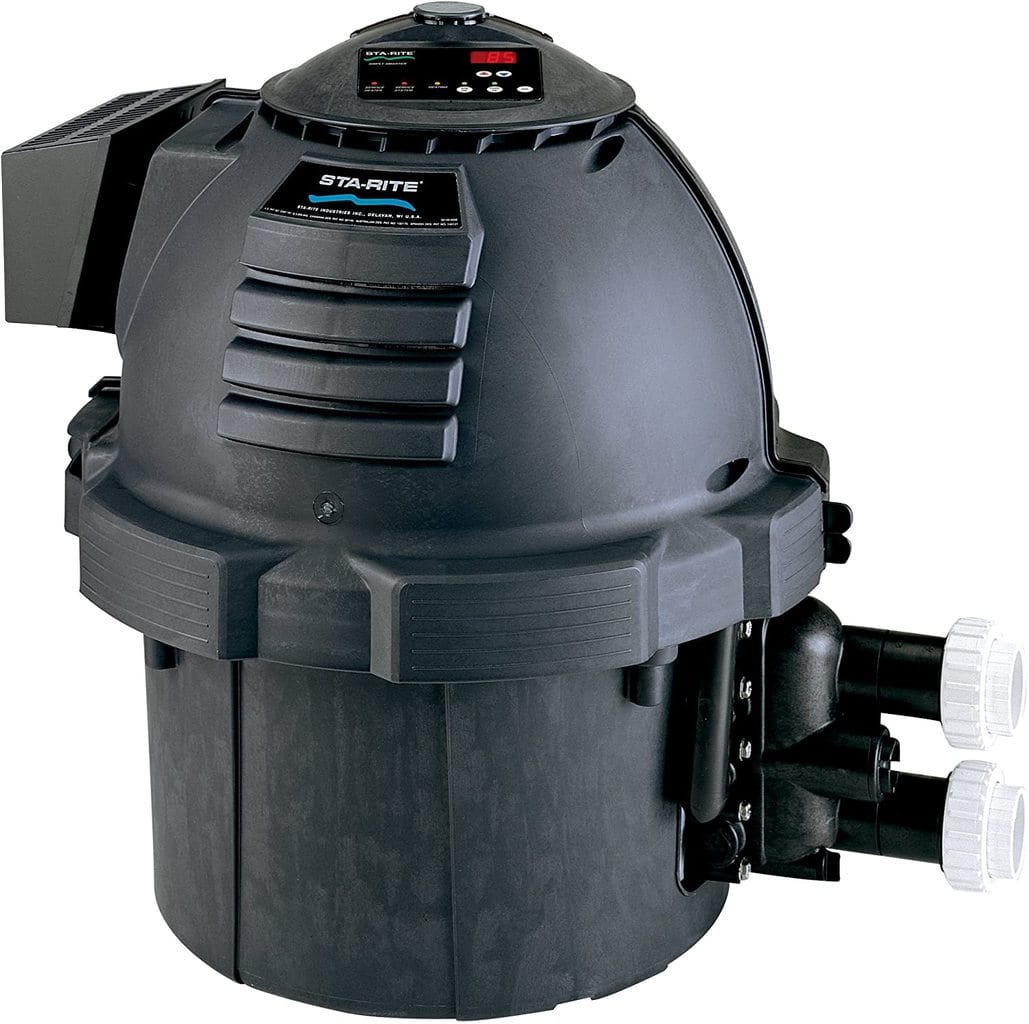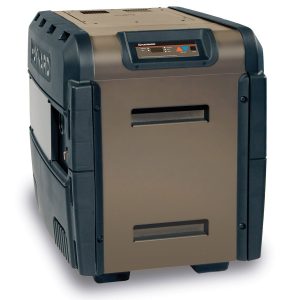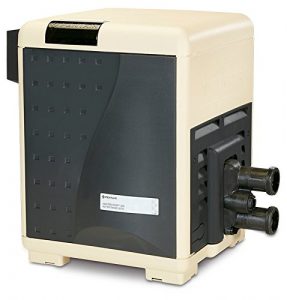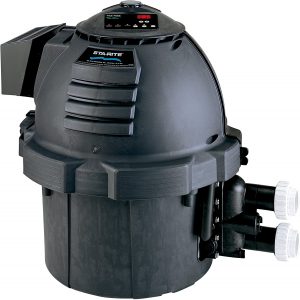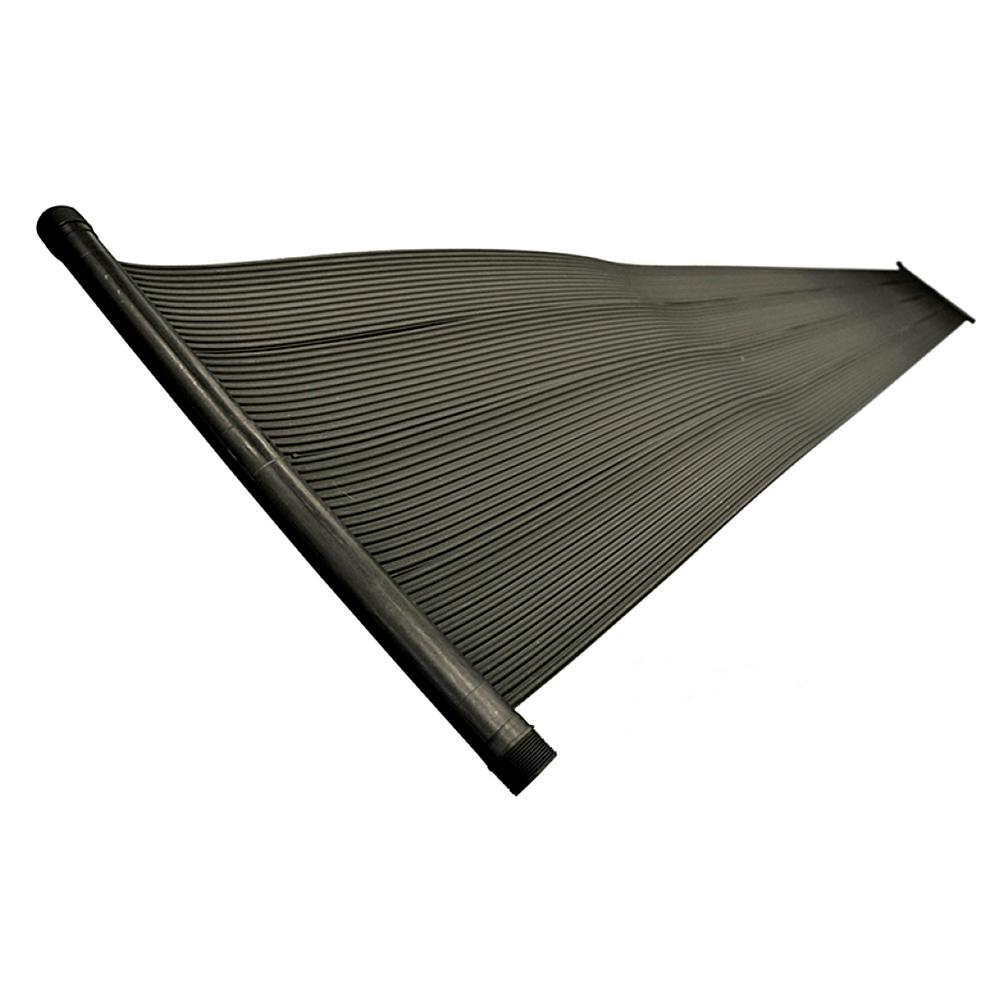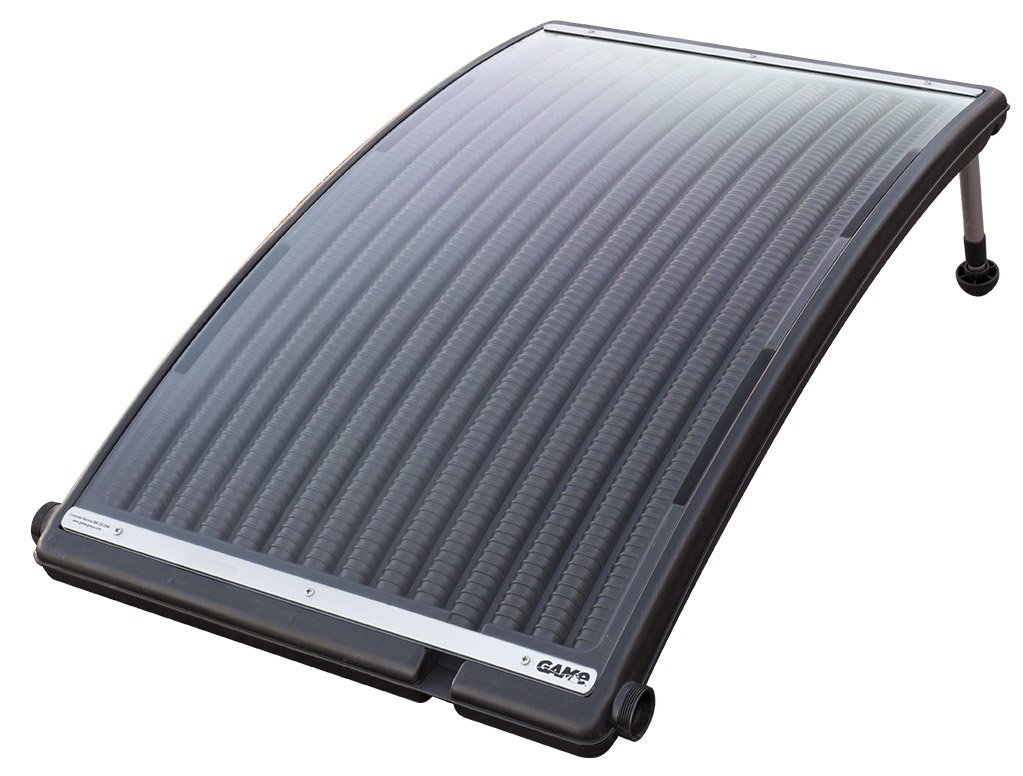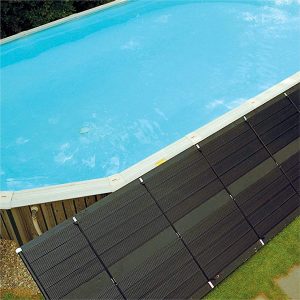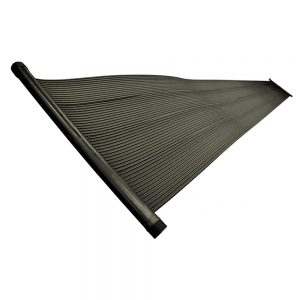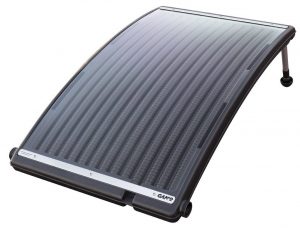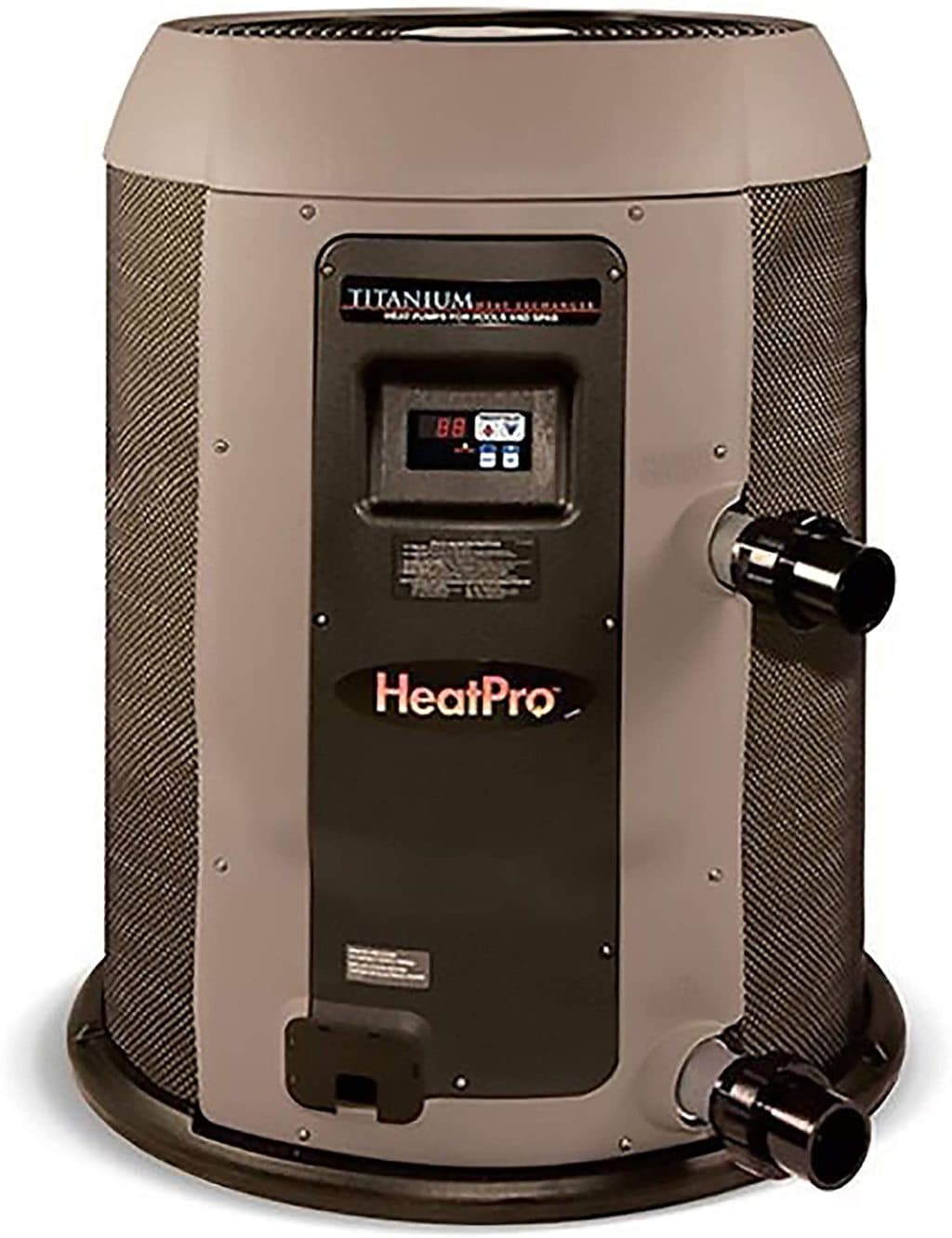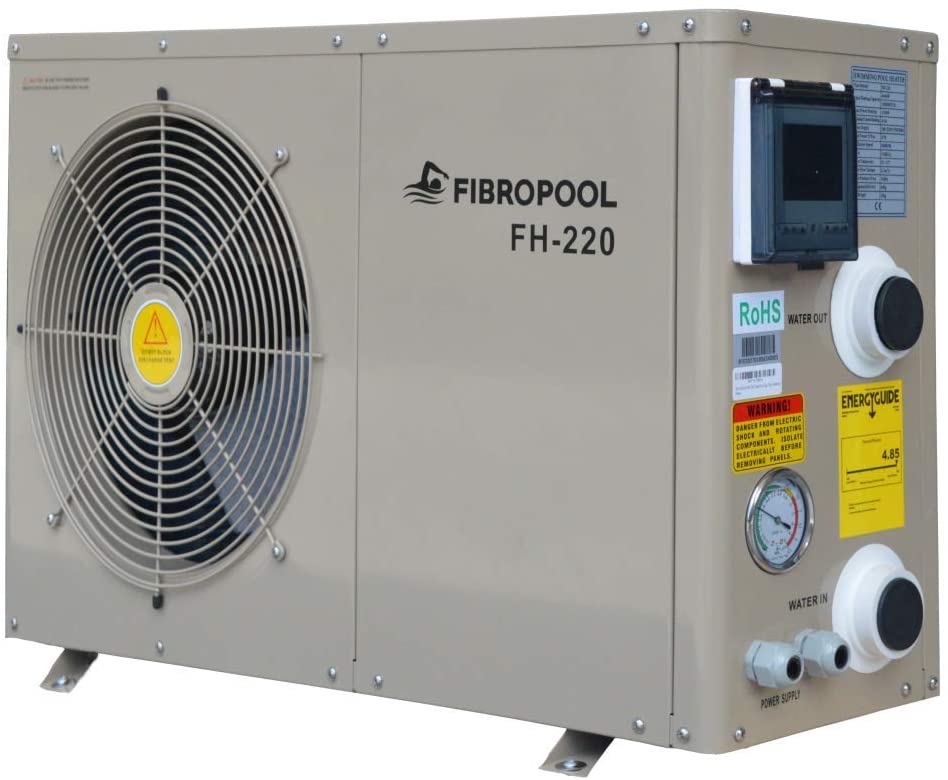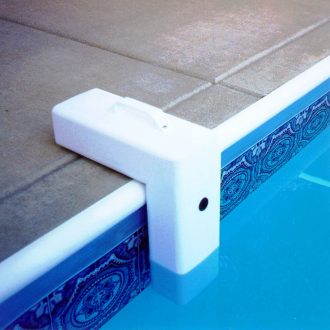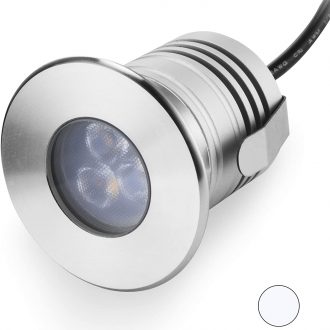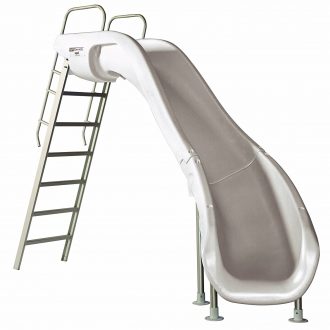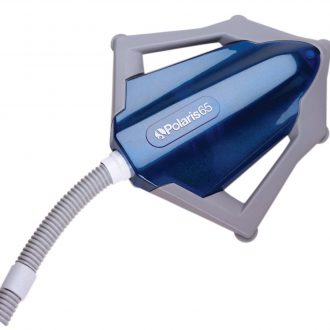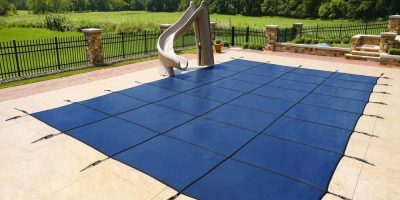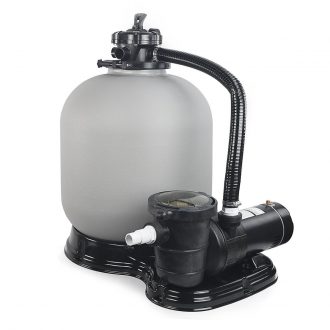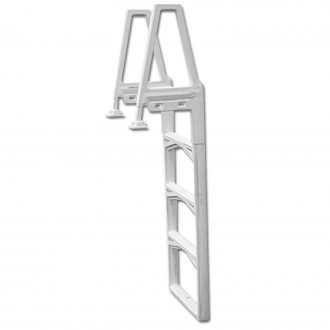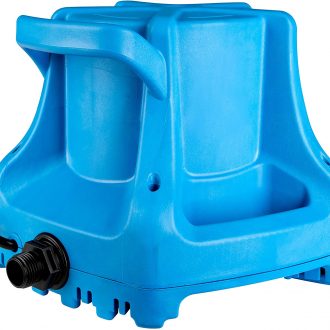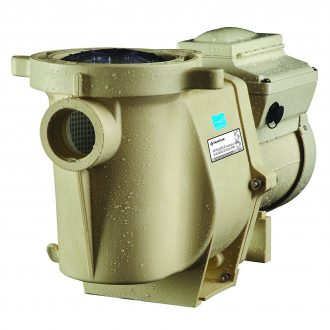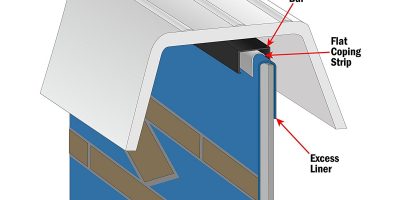Whether you’re simply a fan of swimming in warm water or looking to get more use out of your pool or spa in the cooler months, a pool heater can be a useful addition to your pool equipment pad. In this article, we’re looking at the best gas heaters, solar heaters and electric heaters (heat pumps) for your pool or spa.
Popular natural gas/propane heater from Hayward
Best Gas Pool Heaters 2020
You may also be interested in our selection of the Best Solar Pool Covers.
Below you’ll find a selection of the best pool heaters where the energy source is gas: natural gas or propane.
Popular natural gas/propane heater from Hayward
Hayward 150k BTU Gas Heater
The Hayward 150k BTU gas heater is designed with ease of installation in mind. The unit offers left-side or right-side electric, gas and water connections, with 110v or 220v electric hook up. This unit is also sold in both natural gas and propane configurations.
Features:
- Hayward universal installation compatibility
- Patented polymer header assembly
- Cupro nickel heat exchanger
- Low nitrogen oxide emissions
At the time of writing, this heater is rated 4/5 stars. Some users expressed issues with heater components failing within the first season of installation. These users commented on the difficulty required to get these parts covered under the warranty. Other users, however, reported good performance and part replacement support from Hayward. Click here to see the customer reviews for yourself
- Easy, universal install
- Low Nitrogen oxide emissions
- Polymer header (no rust)
- Smaller size, lower BTU (BTU is a unit of energy measurement, see buying guide below)
- Possible warranty and parts issues with Hayward
Bottom Line
If you own a smaller to medium sized pool and are looking for a gas heater, this is a great way to heat your pool during the off-months. If your pool has an attached spa, this might not be a large enough heater to give you quick access to hot water when you want it. We’ll elaborate on this in our buying guide below!
Pentair MasterTemp 400k BTU Natural Gas Heater
The Pentair MasterTemp 400k BTU Natural Gas Heater is a low nitrogen oxide emitting, high efficiency heater. The heater includes several features that allow for easy use, such as the elimination of a pilot light and the inclusion of a digital display that is focused on quick and simple accessibility.
Features:
- Low nitrogen oxide emissions
- Large 400k BTU output
- Rust proof exterior
- Rotating digital display
At the time of writing, this heater receives 3.9/5 stars. The vast majority of users stated that the heater met their expectations and worked efficiently. One user did note that the product shipped in an already damaged state and had to be swapped for another. Click here to see the customer reviews for yourself
- Large, 400k BTU
- Easy to access display
- Expensive due to size
Bottom Line
If you have a larger pool or have a pool with an attached spa, you should be looking at a 400k BTU heater such as this. The rotating digital display is a nice added feature, especially if your pool equipment is in a cramped space and hard to access.
Sta-Rite Max-E-Therm Pool and Spa Heater
Features:
- 3 different models: 200k BTU, 333k BTU, 400k BTU
- Dimensions: 34” x 27” x 33”
- Weight: 132lbs
Sta-Rite’s Max-E-Therm pool and spa heater distinguishes itself from other gas heaters in its design and size. Despite its unique shape, it stands tall with the competition to provide a fast, reliable heating solution to pools and spas of various sizes due to the three models of varying power that are offered.
Made with Sta-Rite’s proprietary Dura-Glass thermoplastic resin, it is resistant to the elements and wear-and-tear brought on by chemicals and running water associated with pool usage. Functional for both indoor and outdoor installations, this heater uses a standard copper heat exchanger, so care should be used when adding chemicals to the pool as this can accelerate degradation of the internal components.
Like most gas heaters in its class, this unit exclusively uses a 220V connection, so professional installation is recommended.
Sta-Rite’s heater currently has 3.5 out of 5 stars on Amazon. Customers seem split between being very pleased with the performance of the heater, to upset about its longevity and short warranty time. Click here to see the customer reviews for yourself
- High efficiency.
- Lightweight.
- Compact design.
- Potential corrosion issues.
- Short warranty.
Bottom Line
Due to its unique compact shape, this heater might be appealing to consumers who have smaller spaces to work with yet desire a high-powered heater for their pool and/or spa.
Best Solar Pool Heaters 2020
Below you’ll find a selection of the best solar pool heaters which utilize the sun’s rays as their energy source.
We’ve also written an article on Best Solar Pool Covers.
SmartPool S24OU Solar Heater
Features:
- Dimensions: 240” x 27.5” x 16”
- Weight: 18lbs
The SmartPool S24OU is a passive solar heating array that uses your existing pump to move water through its web matrix, heating it before returning it to your pool. All that is required is a one time installation in a well-lit spot and it simply works; No additional electricity or gas required!
This solar heating pad can be installed in many different locations: On a rack, or connected to a roof, set on the ground, or hung on a fence. The system does not come with attachments or materials however, so it’s up to the customer to perform the installation.
Due to the limited nature of this type of water heating, several linked units may be required to increase the water the advertised 6-10 degrees, especially in larger pools. This unit is also unfortunately ill-suited for heating spas as it is not capable of delivering the desired temperature such facilities usually employ.
This solar heating pad has a rating of 3.6 out of 5 stars on Amazon with 85 ratings. Customers who were pleased with it were capable of setting it up themselves, and had realistic expectations for what temperature increase the product was capable of delivering. Purchasers who were dissatisfied mainly didn’t seem to understand the limited nature of this type of water heating. Click here to see the customer reviews for yourself
- Passive heating: Only requires one time set-up, and sunlight.
- Cheap compared to gas or electric heating.
- Single unit does not raise temperature in larger pools by much.
- Does not come with materials or attachments to set-up.
Bottom Line
For consumers who wish to raise the temperature of the water by a few degrees, but aren’t willing to invest in expensive gas or electric options, this solar heating array offers a cheaper alternative.
SunHeater S120U Universal Solar Pool Heater
This 2’x 20’ heat panel can be installed easily in multiple locations such as your roof or fence using the universal slots. The panel comes included with the fittings and materials needed to install this in your current equipment.
Features:
- 2’x 20’ panel size
- Slotted panels for easy installation
- Fittings and adapters included
At the time of writing, this heater scored 3/5 stars. Most substantive reviews ranked the product highly. One user noted that it was too small for their pool, and two others noted that their box was missing parts upon arrival. Click here to see the customer reviews for yourself
- Inexpensive
- Simple to install where needed
- May be delivered with missing parts
- Takes up a lot of space
- Some might view as unattractive
Bottom Line
If you live in a warm climate and are looking to heat your pool up only a few degrees higher, this solar heater could help you out. You will need to have adequate area to install it, and you might need more than one to heat your pool a substantial amount.
Solar Grid Solar Panel
This Solar Grid Solar Panel is a compact panel unit that comes with the hoses and adapters needed to attach to your above ground pool or in ground pool. The unit claims it can raise your pool temperature by 5 degrees in 4 days. Multiple units may be required for larger pools or faster heating results.
Features:
- Curved shape maximizes heat
- Adjustable feet
- Easy to link with additional units
At the time writing, this Heater receives 2.7/5 stars. According to users the fatal flaw of this unit is that the leg supports are fragile and break easily. For those that didn’t have issues with the leg supports, the unit was generally reviewed highly. Click here to see the customer reviews for yourself
- Small footprint
- Well thought out panel shape
- Easy to link multiple units
- Proven issue with leg supports being weak
Bottom Line
Ultimately, there are only a few styles of solar heaters to choose from. This panel provides an alternate design that is more compact and attractive than the sheet-style. For those interested in purchasing this panel, make sure to have your own support structure to mount the panel on, as the feet on this panel are proven to be weak.
Best Pool Heat Pumps 2020
Below you’ll find a selection of the best pool heat pumps which use electricity to “pump” heat into your pool water.
The availability in this category changes rapidly, and so full reviews of the below products are pending.
Pool Heater Buyer’s Guide
How Do the Different Types of Pool Heaters Work?
Pool heaters exist to do one thing: make your water more comfortable to swim in. The more effectively this occurs, the more flexibility you have as a pool owner to swim when you want. Pool heaters are measured in degrees of strength by BTU’s, a degree of measurement that indicates how much energy is required to raise 1 pound of water 1 degree Fahrenheit. The important takeaway is the higher the BTU’s, the quicker you can heat your pool. We’ll discuss picking the right sized heater below!
- Gas pool heaters are fueled with natural gas or propane. The pool pump circulates water from the pool, through the filter, then finally through the heater, before returning the warmed water back to the pool. Either natural gas or propane is burned in the heater’s combustion chamber. This reaction creates heat that is then transferred to the pool water.
- Heat pumps use electricity to transfer heat instead of directly burning fuel and generating heat. Water circulates in the same method as described above, but heat pumps use a fan to draw in outside air that is ran over an evaporator coil. This coil absorbs heat, creating a gas, and then transferring this hot gas to a condenser coil that heats the pool water.
- Solar pool heaters utilize collector panels that must be mounted in areas that get optimal sun exposure (such as your roof). Pool water flows through these panels that have been heated from the sun, and the water is returned to the pool.
Picking the Right Sized Heater
There are a number of different formulas that calculate the exact amount of energy and time required for a pool heater to change water temperature, but most industry professionals follow the following guide:
| Size Heater | Gallons in Pool | Sq. Ft. Surface Area of Pool |
|---|---|---|
| 100k – 200k BTU heaters | 1,000 gals to 10,000 gals | up to 300 sq ft |
| 200k – 300k BTU heaters | 10,000 gals to 20,000 gals | up to 500 sq ft |
| 300k – 400k BTU heaters | 20,000 gals to 40,000 gals | up to 800 sq ft |
| 400k BTU heaters | 40,000 gals to 80,000 gals | up to 1200 sq ft |
It’s also important to note that pools with attached spas should generally be paired with larger BTU heaters. If you plan on using your spa, you generally don’t want to wait around for hours as the water heats. A larger heater can make your spa usable in cold weather in just 15-30 minutes.
Solar heaters are more difficult to size to your pool as they depend specifically on the amount of sunlight the installation area receives. So it’s hard to measure just how much energy output they will create. A good rule of thumb is that the area of your solar collectors should be 75% of the area of your pool if you live in a sunny climate, and closer to 100% if you live in any less than sunny climate.
Which Pool Heater is Best?
Gas Pool Heaters
Gas heaters will always be most effective for pool heat on demand. They are strong enough to be used in the coldest winter months no matter your location and will heat your pool more quickly than any of the other options.
However, there is an associated cost. Natural gas or propane will constantly be used when the water is heating. Natural gas heaters also require an existing gas line to be plumbed at the equipment site. Propane heaters utilize a tank that will need to be refilled often if used frequently. If a natural gas hook-up is available, it will almost always be preferred to propane. To help you calculate a rough cost estimate for using your gas heater, you can try an advanced utilities calculator.
Gas pool heaters are…
- Fastest to heat to high temperatures
- Available in natural gas or propane
- Most expensive utility cost
Heat Pumps
Depending on utility costs in your area, a heat pump will generally be a less expensive way to warm your water. Heat pumps, however, do not work in every climate. When temperatures drop below 45-50 degrees Fahrenheit, heat pumps can no longer convert heat from the outside air and transfer it to your pool water. If you’re just looking to extend your spring and fall swimming time this shouldn’t be a problem, but if you’d like to swim in the winter, this is a deal breaker.
Pool heat pumps are…
- Good for maintaining a smaller temperature increase over time
- Slower to reach desired temperature
- Won’t work in temperatures under 45-50 degrees Fahrenheit
Solar Heaters
Solar heaters heat water at the slowest rate, and require the most ideal conditions to be effective. If you live in a cloudy or rainy climate then you will likely receive few benefits from a solar heater. However, if you live in an already warm climate and would like to continually boost your water temperature by a small amount then a solar heater is a low cost, utilities free solution. Keep in mind that solar heater panels do require a large amount of space to install, and that some buyers might find these panels to be unsightly.
Solar pool heaters…
- Generally require a large panel area to be effective
- Only work in sunny weather
- Next to zero operating costs besides the unit itself
Important Note
It’s important to note that neither solar heaters or heat pumps pack even close to the same punch that a gas heater will. Don’t expect to be able to heat a body of water in a short amount of time. Heat pumps and solar heaters can take days to create a large temperature change in your water, and will be unusable during winter months. Solar heaters and heat pumps are great if you’re just looking to extend your swimming time in the spring and fall, but if you’d like to swim in the winter on the fly, or heat a connected hot tub up in less than an hour, gas is the choice.
Top Tips to Preserve Your Pool Heater
Pool heaters are often one of the most expensive pool equipment pieces to purchase. They are a large investment that is often mistreated and regarded as fragile due to owner neglect. Here is a list of the top things to consider when purchasing a pool heater:
- If you use a salt generator, or chlorine injection system, make sure these are installed after the heater, and that a check-valve (stops water from flowing backwards) is installed between the heater and this system. This prevents high chlorine content water from corroding the heater internals.
- Install a bypass valve for your heater, allowing you to skip the heater while maintaining normal pool circulation. This should be utilized if you plan to winterize your pool, or when adding harsh chemicals.
- Maintain properly balanced pool water. High chlorine levels and low PH are bad for your pool surfaces, as well as any heater components. These corrosive conditions can greatly reduce the overall lifetime of your heater.
- Unless you are familiar with gas plumbing or installing 220-volt appliances, enlist a certified professional to install your pool heater. Incorrectly installed gas heaters can be extremely dangerous, no one wants a gas leak anywhere near their house. If you think you are comfortable installing your pool heater, you may want to check out a helpful walkthrough Hayward has provided:
Conclusion
Whether you just want to add a few weeks to your swimming season, or you’d like to take a dip when it’s freezing outside, make sure you understand the ideal environments each heater works best under. For most heater installations it’s advisable to have a certified professional to the job, as gas plumbing and 220v electrical work can be dangerous. Once your heater is installed make sure you follow the most important rule, enjoy your wonderfully warm water!


